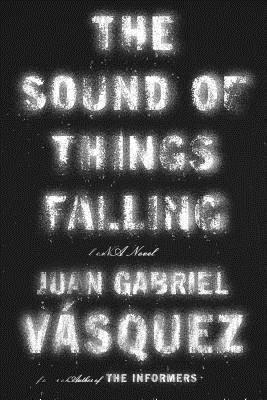 I read this book for the Read Around the World challenge, where a specific country is selected for each month. May’s selection was Colombia. Vasquez is a noted author in Colombia, having won numerous awards, primarily for this novel and for The Informants. He studied law in Bogotá, Colombia and studied literature in Paris at the Sorbonne. He moved back to Bogotá in 2012.
I read this book for the Read Around the World challenge, where a specific country is selected for each month. May’s selection was Colombia. Vasquez is a noted author in Colombia, having won numerous awards, primarily for this novel and for The Informants. He studied law in Bogotá, Colombia and studied literature in Paris at the Sorbonne. He moved back to Bogotá in 2012.
I originally started reading The Informants, but it didn’t feel like it was very much about the country itself. The Sound of Things Falling is about Colombia during the violent drug-trafficking reign of Pablo Escobar. Through one man’s memories, Vásquez explores not only the problems occurring during the 1970s and 80s, but its later consequences on residents of the country.
One day I’d like to find out … how many like Maya or like me had a calm or protected or at least unperturbed childhood, how many traversed their teenage years and fearfully became adults while the city around them sank into fear and the sound of gunshots and bombs without anyone’s having declared any war, or at least not a conventional war, if such a thing exists.
In 1996, Antonio Yammara is in his twenties and teaching Introduction to Law in Bogotá. He befriends an older man, Ricardo, while playing pool. Ricardo tries to tell Antonio about his life but Antonio doesn’t want to hear it, which he regrets when Ricardo is murdered. Antonio is traumatized by the murder but wants to find out more about his friend. The novel tells two parallel stories: Antonio’s in the present day, and Ricardo’s life leading up to the present.
I found this book to be very readable and emotionally moving. Antonio is not a likable human being (to start with, he sleeps with his students) but the breakdown he experiences after Ricardo’s murder feels very real, as does his need to know more about Ricardo’s past. And he grows considerably as the story progresses.
Now Laverde’s tears were not the same, couldn’t be the same ones I’d witnessed in the Casa de Poesia; now they had a density they’d previously lacked, owing to the simple fact that I’d heard what he, sitting in that soft leather armchair, heard that afternoon. Experience, or what we call experience, is not the inventory of our pains, but rather sympathy we learn to feel for the pain of others.
Often the structure of what I’ll call “past/present storyline” novels feels forced, but here it didn’t feel like Antonio was present just to relay a story. I do wish Vásquez had made him a bit more sympathetic, but in truth, Ricardo himself is not an entirely sympathetic character. It’s a story of two very flawed men who are trying to get by in a violent and corrupt time (Escobar’s reign is over in the 90’s but the consequences are far-reaching). In contrast, the women in these men’s lives are not only sympathetic but extraordinarily patient. Although Ricardo’s Elena has some faults as well.
I won’t tell you what the title refers to, but here is where it’s mentioned:
It’s the sound of things falling from on high, an interrupted and somehow also eternal sound, a sound that didn’t ever end, that kept ringing in my head from that very afternoon and still shows no sign of wanting to leave it, that is forever suspended in my memory, hanging in it like a towel on a hook.
Anyone who wants to know more about Colombia during the time of Escobar should definitely read this book. But that’s not the only reason to read it. I also appreciated Vásquez’ detailed, visual descriptions of Bogotá and nearby towns. And there’s a thoughtful, emotional quality to the writing that kept me engaged throughout, with its recurring themes of memory and regret.
Thanks to The Reader’s Room for pointing me towards a book I’d never have read otherwise.

